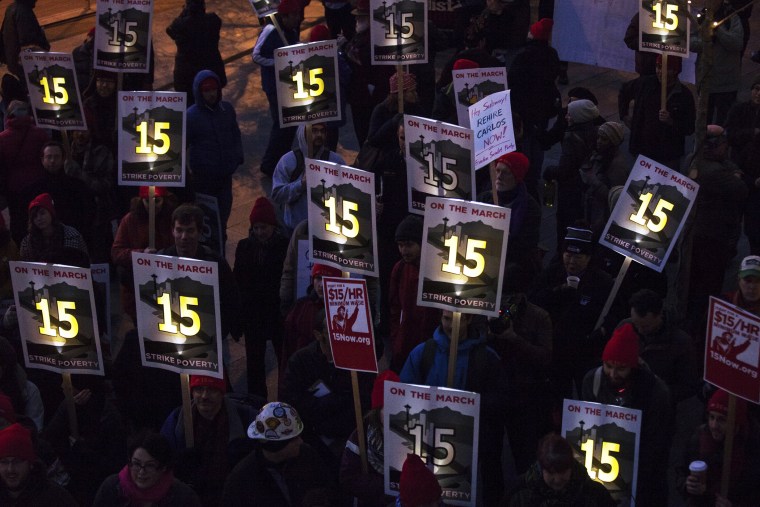Seattle's legislative battle over the $15 minimum wage is over. The legal battle has just begun.
In early June, shortly after the city's mayor and city council agreed to a staggered minimum wage increase, the International Franchise Association (IFA) filed a lawsuit claiming that the new law discriminates against franchisees. The industry group followed up with another legal filing this week: A motion for a preliminary injunction against certain provisions of the minimum wage law.
As it currently stands, the law allows small businesses to increase their wages at a slower rate than large businesses. Those companies with 500 or more employees need to achieve a $15 hourly base wage within the next three years, while small businesses have seven years to achieve the same target. But the law also designates franchisee businesses as large businesses; in other words, a McDonald's location with 20 employees is effectively a "large business" under this particular law, even though the McDonald's Corporation itself technically does not own the location. In its motion for an injunction, IFA argues that franchisees should be classified as small businesses, and that the current law illegally discriminates against the franchise business model.
"If the minimum wage had been raised to $100 in Seattle, we would have disagreed," said IFA senior vice president Matthew Haller. "But if they had done it uniformly, we wouldn't be filing a lawsuit."
IFA frequently lobbies on behalf of corporate-friendly policies in Washington D.C. and around the country. The group was a staunch opponent of the Affordable Care Act, and was making claims about the law's job-killing properties as recently as late November 2013. Last election cycle, IFA contributed nearly a quarter of a million dollars to congressional candidates, mostly Republicans, according to OpenSecrets.org. In addition to opposing minimum wage hikes on the state level, IFA has also been vocal in its opposition to a proposed $10.10 federal minimum wage hike.
The Seattle lawsuit, and the city's legal defense, is just part of a larger battle over the legal status of the franchise business model. While the IFA claims that franchises are just like any other small business, groups like the National Employment Law Project (NELP) insist they should be considered in a separate category due to their relationship with major franchisor businesses like the McDonald's Corporation. NELP general counsel Paul Sonn told msnbc that it is "perfectly legal" to distinguish between franchisees and other small businesses, given their place within larger franchise supply chains.
"We think this is a sensible policy choice based on the understanding that franchisees like McDonald's and other fast food chains benefit from the economy of scale, and can start paying a higher wage faster than other companies," he said.
However, those franchisees might need the acquiescence of the franchisors in order to successfully scale up. Recent wage theft lawsuits against McDonald's allege the company maintains rigorous control over many aspects of its franchisees' business and labor practices. In addition to collecting hefty licensing fees from its franchisees, the company is said to keep tabs on labor costs, sales, time cards, and inventory. If franchisees are to increase wages yet remain in the black, it may only be because some franchisors relax their standards in the Seattle area.
"I'd have to imagine that the franchising chains are a major force behind it," said Sonn of the lawsuit. "Because they recognize that if their franchisees have to pay higher wages, there'll have to be some accommodation in the fees that they charge them."
Haller said he couldn't comment on the business practices of specific franchisors, but insisted "the franchisor isn't in the store making decisions about staffing or benefits." As such, he argues it should be treated like any other small business.
The legal battle over Seattle's minimum wage is broadly similar to the fight over whether franchisors count as "joint employers" for their franchisees' workers. Last week, the general counsel for the National Labor Relations Board (NLRB) determined that McDonald's Corporation should be considered a joint employer, meaning it shares legal culpability for the labor conditions at its various franchised locations. Haller said both the NLRB decision and the Seattle minimum wage law are part of a "larger assault on American free enterprise and franchising specifically in this context."
A spokesperson for the Seattle City Attorney's Office said the department would not comment on the ongoing litigation.
